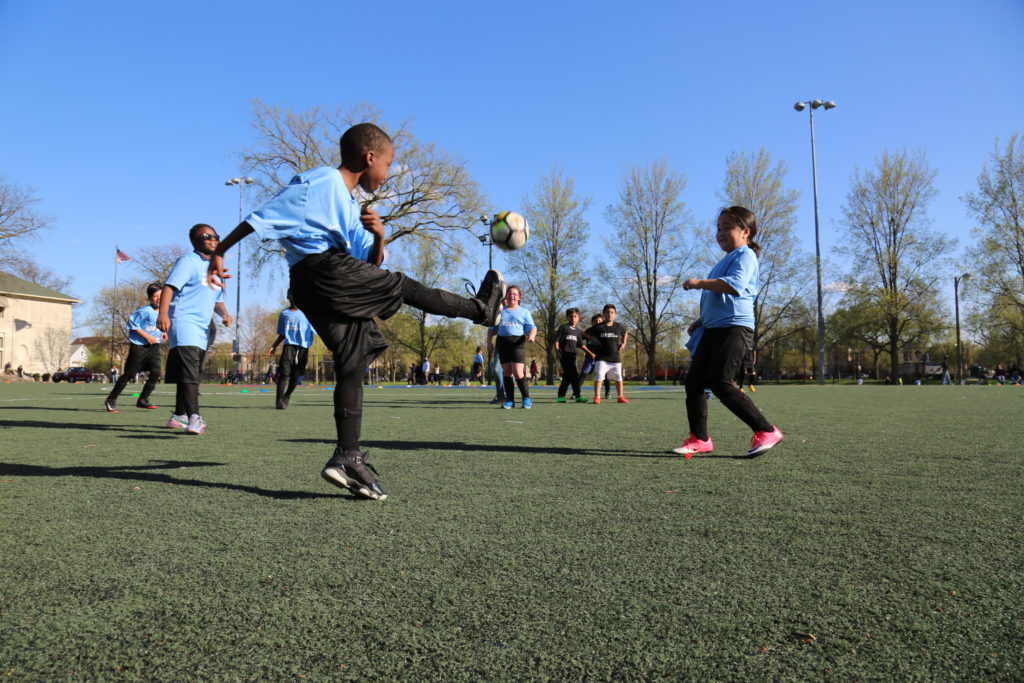Urban Initiatives utilizes research-backed, evidence-driven curriculum to guide our program sessions. Our curriculum allows us to prioritize the outcomes — like social emotional learning and physical health — that we find are most important. It also allows our coaches across the city of Chicago to provide consistently high quality, high impact programming.
This summer a team of Urban Initiatives staff and Board members worked together to improve our elementary schoolers’ health and education soccer program curriculum. We sat down with Urban Initiatives Program Director, Sara Shanley, who oversaw the project to chat about the updates.
Sara, tell us a little bit about your role at Urban Initiatives.
I’m a Program Director for the Continuum of Programming. I oversee our program model and curriculum development.
Can you tell us what is the Urban Initiatives health and education soccer program curriculum and why do we have one?
The curriculum for our health and education soccer program is a series of ten weeks of soccer games and activities that have social emotional learning and healthy lifestyles messaging built into the games in some way.
We have a curriculum to make sure all our students across our sites are receiving the same content and high quality program.
This summer, the curriculum underwent some major updates, what inspired these changes?
We listened to our coaches and heard the feedback that our participants had been playing some of the same games for several years in a row. We wanted to incorporate some new games into our programming and update our research rationale behind those games because it had been some time since we had revised the research rationale.
Can you remind us what a research rationale is?
A research rationale outlines what the proven methods are. In this case, we looked at what is the research rationale for teaching social emotional learning. What components of our curriculum are going to have the biggest, long-term outcomes for our youth, so we can focus on that in our program.
So after reviewing the research what changes did you make?
In the past, we hadn’t emphasized soccer skills mastery as much- it was something that happened naturally through our games, but the new curriculum works to improve soccer skills very intentionally.
We did this for a couple of reasons. The first is that we think that increasing the focus on soccer skills will improve our ability to retain students over time and keep kids more engaged. The second is that, as our kids see progress in their soccer skills, they are building their self-confidence and self-efficacy. That’s something that translates outside of soccer. When they are improving their soccer skills week to week they can see that ‘I can do this on a math test too. I can practice and get better at something’
Who on the UI team helped on this project?
We had a lot of help putting together this new curriculum.
Our Evaluation department put together a ton of research about health and social emotional learning. From this, they were able to recommend weekly focuses for each week of the soccer season. Some of the examples include: limiting screen time and regulating your emotions.
One of our Program Managers, Eugene Tsipris, who has extensive soccer experience, helped us put together most of the games and activities for the curriculum. He really helped to create the soccer skill-building components of the curriculum.
Urban Initiatives Board member and former professional soccer player, Brian McBride, helped us brainstorm some awesome new games for the curriculum as well. He made sure that our students can learn new soccer skills in fun and engaging ways.
Finally, we leaned heavily on US Soccer’s Grassroots Coaching course that outlines best practices for formatting a soccer practice to teach skills.
We’ve heard about a lot of the changes to the program, but what’s staying consistent?
The program will maintain its foundations for sure. We will still have 60 minutes of moderate to vigorous physical activity during every session. We will still have a big idea discussion that will focus on social emotional learning and health topics. Our participants will still scrimmage regularly. Team Captains will still lead warm ups and help guide discussions. We are definitely still staying true to our roots.
So, what do you like best about the new curriculum?
The new curriculum now includes time to scrimmage at every practice. I think that’s what our kids want and research from US Soccer shows that’s how kids build the most skills. Scrimmaging and playing the game is the biggest draw for them and it’s going to have a huge impact on our fun factor.
What comes next? How will you roll this curriculum out to our coaches?
We will roll out the new curriculum at our Fall Launch at the end of August. The Fall Launch is a training session where coaches will get the big picture framework of the new curriculum and we will start to teach some of the new games. Then, throughout the year we will provide extra support to our Program Coordinators, reviewing the games each week, so that as they visit schools they can review them with our coaches. This should ensure that our coaches are prepared to implement our new curriculum at every school.
—
We are excited to launch our fall season in September and debut our new curriculum. Urban Initiatives is committed to continually refining our programs and curriculum to provide the highest quality programming for our participants.




